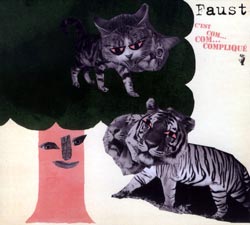
Under most circumstances, the arrival of a new recording by seminal krautrock legends Faust would be cause for celebration and the flying of flags. But, alas, things are much different in Faust-land, post 2003: the band has essentially split in two, both versions functioning independently of the other, yet both maddeningly (or what might well be apropos) nicked Faust. It could make for an embarrassment of riches for the Faust devote� or a confusing, unnecessary injection of Krautrock overdose. The death in 2007 of founding member Uwe Nettelbeck no doubt cast a pall (amid some bit of acrimony) amongst the surviving members (remember, these gents have been carrying on since the wistful Germanic psychedelic days of the early 70s!), but, yet, amidst rock's perennially self-perpetuating, Hollywood-esque carnival of rebooting/recycling, Faust trudge valiantly onward, although to what end remains a mystery.
C'est Com...Com...Compliqu� is, at best, a discordant echo of a once-proud Faustian legend, rife with the blim and bluster of the collective's early Dadaist recordings though bereft of that era's abundant, unique strangeness. At one time unthinkable, truth be told, this year's Faust seems to have merely adopted the posture of a, well, fairly straightforward rock band. Gone are the surreal collages and stop-start edit techniques beloved as well by contemporaries such as Holger Czukay and his compadres in Can: in its place is a dense marching dynamic replete with a laboratory of the heaviest metals, those familiar strangled German vocals espoused in unintelligible dialects, and torrential slabs of tribal drumming that are about as subtle as a mid-air collision. Granted, Faust's legacy always featured a useful surfeit of aural anarchy, but they were capable of graceful moments as well, particularly so on their still devastating debut, a record to marvel at over 30 years down the line. Here, the act of songwriting, never perhaps Peron's or Diermaier's strong suit, is woefully subjugated to whatever mighty riffs can just tear the studio part.
There are bits and pieces of warped acoustics and the pitter-patter of discrete electronics hereabout, like folk music played in a factory full of broken windows, the stench of history pervading it's now-porous walls, but for the most part the record feels artfully strangled, devoid of the ideaistic oxygen needed to lift the spiky noises out of the mundane. Live, one would expect some of this material to achieve transcendent proportions � coming out of your stereo speakers, this isn't music that, in decades past, made deals with the devil, but instead merely seeks to indelicately cover its hand, a bluff of little shadow or substance.
Comments and Feedback:
|



